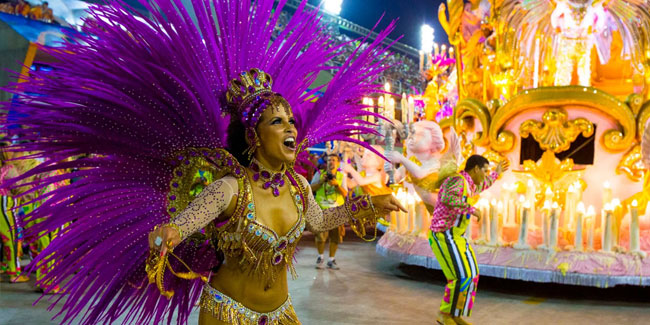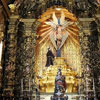Carnival in Rio de Janeiro
Carnival in Rio de Janeiro is held on February 13. While carnival is found throughout Brazil, Rio’s carnival is one of the biggest, most vibrant and electric to be found. This event in the second decade of the month February is annual.  Help us
Help us

Carnival in Rio de Janeiro is a popular religious and social-historical festival that has been held for five consecutive days in February since 1893, when the first carnival ranch, the "King of Diamonds", was created by Hilário Jovino Ferreira, from Pernambuco. This festival is considered the largest carnival in the world by the Book of Records. It is a world famous celebration, consisting of different types of cultural manifestations, such as samba school parades, masquerade balls, mobile parties of blocos de embalo followed by their costumed revelers, and also street bands and samba bands ("escolas de samba" of small size), called cordões. It is also characterized by irreverence and banality, by names with double meanings (especially those of the blocos), and by cultural, musical, and sexual diversity.
The competitive parade of samba schools was idealized by journalist Mário Filho (brother of playwright Nelson Rodrigues and from Pernambuco like Hilário Jovino), who organized through his periodical Mundo Esportivo the first official competition in 1932. Another Recife native, Pedro Ernesto, also acted decisively for the success of the event: when mayor of the then Federal District, he became the first politician to give financial support to the carnaval, within a project that aimed to transform Rio de Janeiro into a tourism power, and in 1935 he recognized and made official the parades.
Rio's carnival can be considered a highly prestigious cultural event, having already been elected, by the internet users of the foreign website Fun Party, as the best party in the world. It is constantly cited as the most famous carnival in existence.
Similar holidays and events, festivals and interesting facts
 Our Lady of Navigators in Brazil on February 2 (it is the official day of Iemanja and celebrations take place throughout the city);
Our Lady of Navigators in Brazil on February 2 (it is the official day of Iemanja and celebrations take place throughout the city); Day of lies in Brazil and Portugal on April 1 (Dia da lieira);
Day of lies in Brazil and Portugal on April 1 (Dia da lieira); Easter in Western Christianity on April 5 (Første påskedag in Norway)
Easter in Western Christianity on April 5 (Første påskedag in Norway) International Sylveon Day on February 21
International Sylveon Day on February 21 World Day of Prayer on March 6
World Day of Prayer on March 6 International Day of the Unborn Child on March 25
International Day of the Unborn Child on March 25 Holy Saturday on April 4
Holy Saturday on April 4